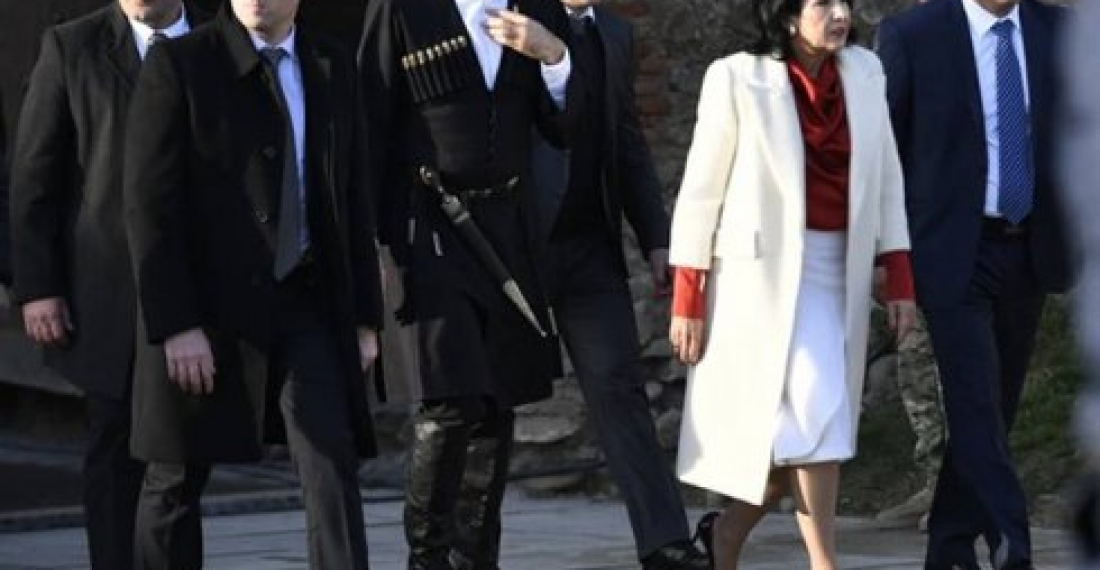Salome Zurabishvili was sworn in as Georgia's fifth president on Sunday, at a ceremony in the historic city of Telavi in Eastern Georgia. With the swearing in of the new president a number of important constitutional changes, adopted in 2017, have now come into force.
The changes provide for a reduced role for the office of president, as the process to change Georgia into a parliamentary republic are completed. The next president of Georgia will forthwith be elected by an electoral college and not by direct vote. The National Security Council, hitherto chaired by the president, has now been abolished. Several prerogatives that up to now belonged to the president have now reverted to the prime minister, whilst the role of the president in the administration of the judiciary has been taken over by the Supreme Judicial Council.
Salome Zurabishvili will serve for six years. In that period it is likely that her biggest challenge will be to define the new role of president, in a way that keeps it relevant, but respecting the fact that it is now a symbolic, rather than an executive, office. An indication of how she plans to do this emerged from her inauguration speech yesterday where Zurabishvili tried to leave behind her the controversies that surrounded her election a few weeks ago, and to project herself as a symbol of national unity. She went out of her way to highlight the achievements of her four predecessors which she mentioned by name. She made it very clear that she now expected to be the president of all Georgians despite the fact that she had been elected with the support of the ruling Georgian Dream party:
"I am grateful to the "Georgian Dream" party for supporting me as an independent presidential candidate. In doing so, it took a vital democratic step towards a Presidency that strives to stand above the fray of party politics.
I respect voters who did not cast their ballot for me. I am also aware that different parties have taken controversial positions, even regarding my recognition as President.
Regardless, I have a constitutional duty to be the President of all Georgians, to be the President of every citizen of Georgia from this day forward. Inclusiveness is of the main principles of democracy. The modern state is based on the premise that an elected President is duty-bound to serve each and every citizen.I will do everything in my power to guarantee individual rights and freedoms. I will defend the rule of law. I will strive to strengthen civil society and further improve the country's political culture.
But we should all work in the same direction. The independent media, the non-governmental sector, and every citizen can and should play a positive role in building a more united country."
Commonspace.eu political editor said in a comment that "this is easier said than done. The opposition, spearheaded by the United National Movement, continue to challenge the election result. They organised a protest near the venue of the inauguration ceremony on Sunday, and clashed with police who tried to keep them at some distance. There is currently little appetite in Georgia for street protests. But, as happened in the past, the opposition hopes to find the right moment to mobilise the malcontents, and there are plenty of issues on which the government remains unpopular.
Georgian politics remain colourful and eventful. Yet beyond the theatrics of politics there are some very basic issues related to the country's economic development and general quality of life of the people that have now become more important for Georgians than abstract promises of European orientation or national re-unification. It is on those issues that the Georgian Dream will have to deliver in the next two years, ahead of parliamentary elections in 2020. The new constitutional changes that came into effect on Sunday further consolidate the Georgian Dream control over the leverages of government. With a friendly head of state now installed, the ruling party has no one lese to blame but itself if it fails to deliver on its promises, and on the aspirations of the Georgian people.
source: commonspace.eu
photo: The new president of Georgia, Salome Zurabishvili, arriving at her swearing in ceremony on Sunday 16 December, in the city of Telavi in Eastern Georgia (picture courtesy of Inter Press News)







